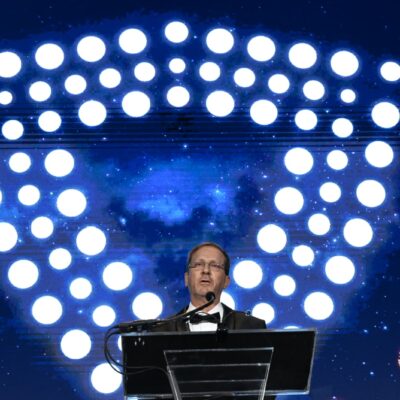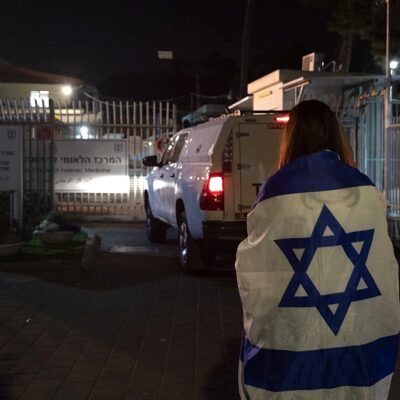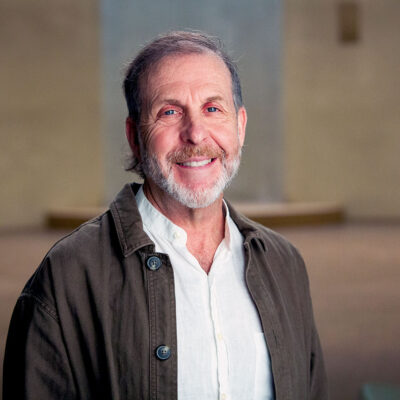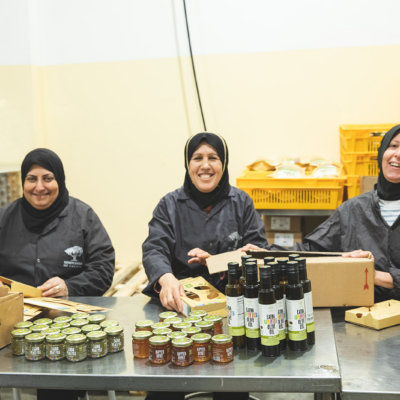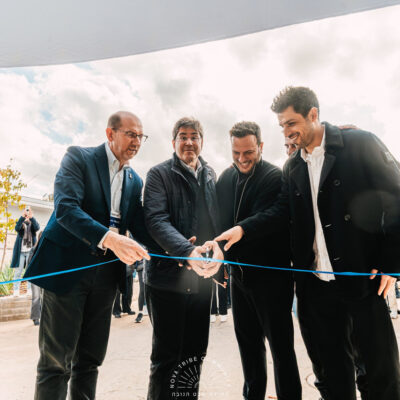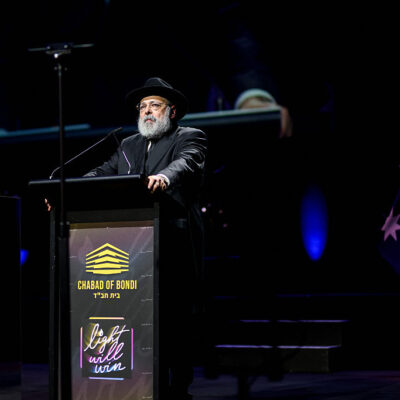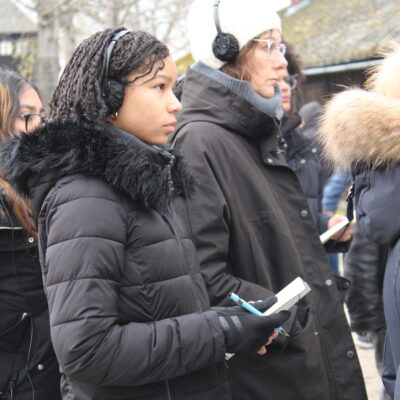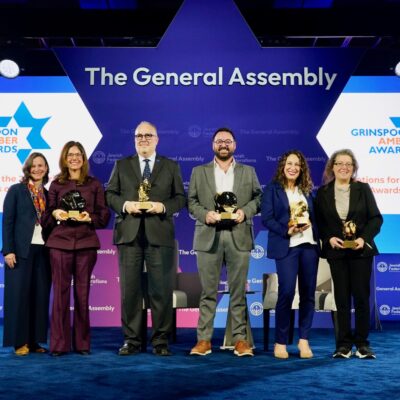surfing ceo
Finance, rabbinics and practical experience fuel L.A. Jewish community foundation’s new top exec
Taking over for Marvin Schotland, Rabbi Aaron Lerner hopes to grow foundation's $1.3 billion endowment, with a focus on donor-advised funds

Courtesy of the Jewish Community Foundation
Rabbi Aaron Lerner, an avid surfer, holding a surfboard that was presented to him as a farewell gift upon transitioning from Hillel at UCLA to his new position as president and CEO of the Jewish Community Foundation of Los Angeles
Even in laid-back Los Angeles, the full-size surfboard propped upright in Rabbi Aaron Lerner’s office stands out — the board nods to the CEO’s enjoyment of surfing, and — displaying logos of some of the L.A. institutions that have shaped him — charts where he’s been professionally. Lerner, most recently the executive director of UCLA’s Hillel, assumed the role of president and CEO of the Jewish Community Foundation Los Angeles in January. He succeeds Marvin Schotland, whose tenure lasted 33 years.
Lerner’s eclectic professional history includes 10 years in real-estate finance, originating debt and equity funding for commercial transactions ranging from $15 million to $250 million. During 2008’s financial crisis he went to rabbinical school at Yeshivat Chovevei Torah, an open Orthodox seminary in New York, and was ordained in 2013.
“I’m a rabbi who can read a spreadsheet,” Lerner quipped in an interview with eJewishPhilanthropy. “It’s a nice overlapping skill set because I care deeply about the community from a pastoral and rabbinic kind of perspective [and] have a business head for being able to work through the many details that it takes to go from caring to actually implementing and doing.”
Leading the foundation means considering the future viability and potential for Jewish L.A. over the next half-century, and about what assets are needed to ensure that future.
At the end of 2022, the city’s Jewish community endowment was $1.3 billion (down from 2021’s year end $1.6 billion due to some stock market instability) In either case, Lerner says that is not enough for a city of L.A.’s size, suggesting that an endowment of $5 billion-$6 billion would be able to support the community through crisis and cover some of the expensive services in the community, such as Jewish summer camp, Jewish education from early childhood through adulthood and caring for the elderly. “We have to make sure, right now, as we’re going through the biggest intergenerational transfer of wealth ever, that people are actually investing in the city and its Jewish infrastructure for the next 50 years, and they’re going to do that at the foundation,” he said.
The new CEO is also listening to and learning from the approximately 30 staff members, the 1,400 families who have invested charitable assets in the foundation, approximately 500-600 local nonprofits per year and the community professionals making things run.
When Lerner joined the foundation two months ago, he succeeded Schotland, who had helmed the foundation since 1989. This experience echoed one he had when he arrived at UCLA Hillel, where he took the leadership reins from Rabbi Chaim Seidler-Feller, a campus fixture for 40 years, continuing the work while putting his own stamp on leadership.
The key to managing a professional inheritance, he said, is “a really deep appreciation of what has happened to bring whatever organization is up to this point, and then a sense of possibility for where it could go from here,” he said. Schotland led the foundation for 33 years and grew its assets to the current $1.6 billion, which Lerner called “very substantial” and “absolutely incredible.”
Lerner describes himself not as a founder, but as a builder. “Founders are people who like to take those seed ideas and bring invention to fruition; I’m much more [about] putting all of the pieces together to make something more of something that’s more substantial than the individual parts. And I think about both the foundation and the city through that lens.”
That the work of the foundation provides “an undergirding for everything else that is happening in the city Jewishly,” became most apparent during COVID, Lerner said, as the foundation — along with the Paycheck Protection Program, government resources and a few other sources – prevented many of the city’s Jewish nonprofits from going out of business.
While some cities’ community foundations are combined with their local Jewish federations, the Jewish Community Foundation in Los Angeles is governed independently, though they have a relationship that Lerner described as “complementary and collaborative.”
“We both want to see the other thrive,” Lerner said, adding, “It’s healthy for the city overall, to have both a healthy federation and a healthy foundation.”
Lerner said that growing donor-advised funds, which he called “the most obvious vehicle for giving,” is a priority. Americans put $73 billion into DAFs in 2021, he added, a sign that people in the community “are thinking about their legacies.” He called intergenerational giving “an incredible opportunity for families to inform each other’s values and thinking and philanthropic priorities.”
Lerner also said that he had an opportunity to meet the fund holders, including some whose large donations were anonymous to the public.
“They’re taking care of the community,” he said, adding that “the sense of responsibility and caring that comes from being able to see all of those folks who I never even knew about is really touching and beautiful.”
Like most other organizations and businesses during the pandemic, the foundation was also forced to change its priorities and respond to the immediate crisis, reinventing its traditional grants programs (Cutting Edge, Israel and General Community Grants) as the COVID-19 Response Grants and Reimagine Grants. A total of $12 million of these grants were distributed to nearly 100 local nonprofits in 2020 and 2021. During this same period, foundation donors contributed an additional $6 million from their own charitable funds that are administered by the foundation. This brought total giving to $18 million — the largest amount ever directed by the foundation to a single cause in such a compressed time period. The foundation’s traditional institutional grant programs resumed in 2022.
As community priorities change funders need to stay up to date on community needs, Lerner said, offering as examples: mental health crises due to the pandemic, especially in younger people; technology informing philanthropic trends; and a leaky Jewish educational or professional pipeline.
Or, for instance, the Jewish community study launched by the Jewish Federation of Greater Los Angeles last year in partnership with the foundation revealed that about a third of the city’s Jews are in financial need.
“We need to be able to take care of Jews who are living in poverty and with the effects of the pandemic,” Lerner said. “And we have an obligation to the city as well, more broadly. Funders really need to be constantly taking in information about what’s actually happening, and then drive resources towards the places where it can be most effectively and importantly deployed.”
Lerner said he also wants to streamline the grant process, to make it “as frictionless and as easy as possible” for Jewish professionals to apply for and report on grants.
Each foundation account is its own charitable vehicle for the people who established it, whether it’s an endowment, a DAF, or a family philanthropy — money that comes out from those accounts is actively directed from those people and or their families to approximately 2,500 nonprofits, mostly across Los Angeles over the course of a year. About two thirds of those grants support Jewish- and/or Israel-based programs, with the remaining third supporting community grants.
DAFs are easy and relatively low-investment — the foundation’s fund investments start at $5,000 — 90% of the foundation’s incoming funds come through existing accounts. Lerner suspects the reason that many of the 740,000 people living in L.A.’s Jewish households don’t realize DAFs are an option for their income bracket, Lerner said. “There’s actually an almost unlimited horizon for being able to expand and grow. It’s really at your discretion, you put the 5000 in and spend it all that year or over a period of other years, or — as many people do — you add to it as opportunities arise.”
In addition to local domestic issues and efforts, about 14% of foundation grants and 29% of donor grants support diverse Israel programs, guided by an on-the-ground consultant in Israel. Lerner, who participated in an early Taglit-Birthright Israel trip, met his wife Rachel – now dean of the School for Jewish Education and Leadership at American Jewish University — in Jerusalem, studied in yeshiva for two years, and identifies as a “proud Zionist.” His and his family’s Jewish life “is the central organizing principle of our lives,” he said, adding that Judaism can make a huge difference in people’s lives.
“A lot of people feel lost right now. And I think that community and family and the ways in which Judaism has been organized for 2,000 years, it’s likely we will continue to be organized around those principles for the next 2,000 years. And in this current moment of dislocation,” Lerner stressed, “it’s providing us with an opportunity to actually come back together, which we need.”

 Add EJP on Google
Add EJP on Google

